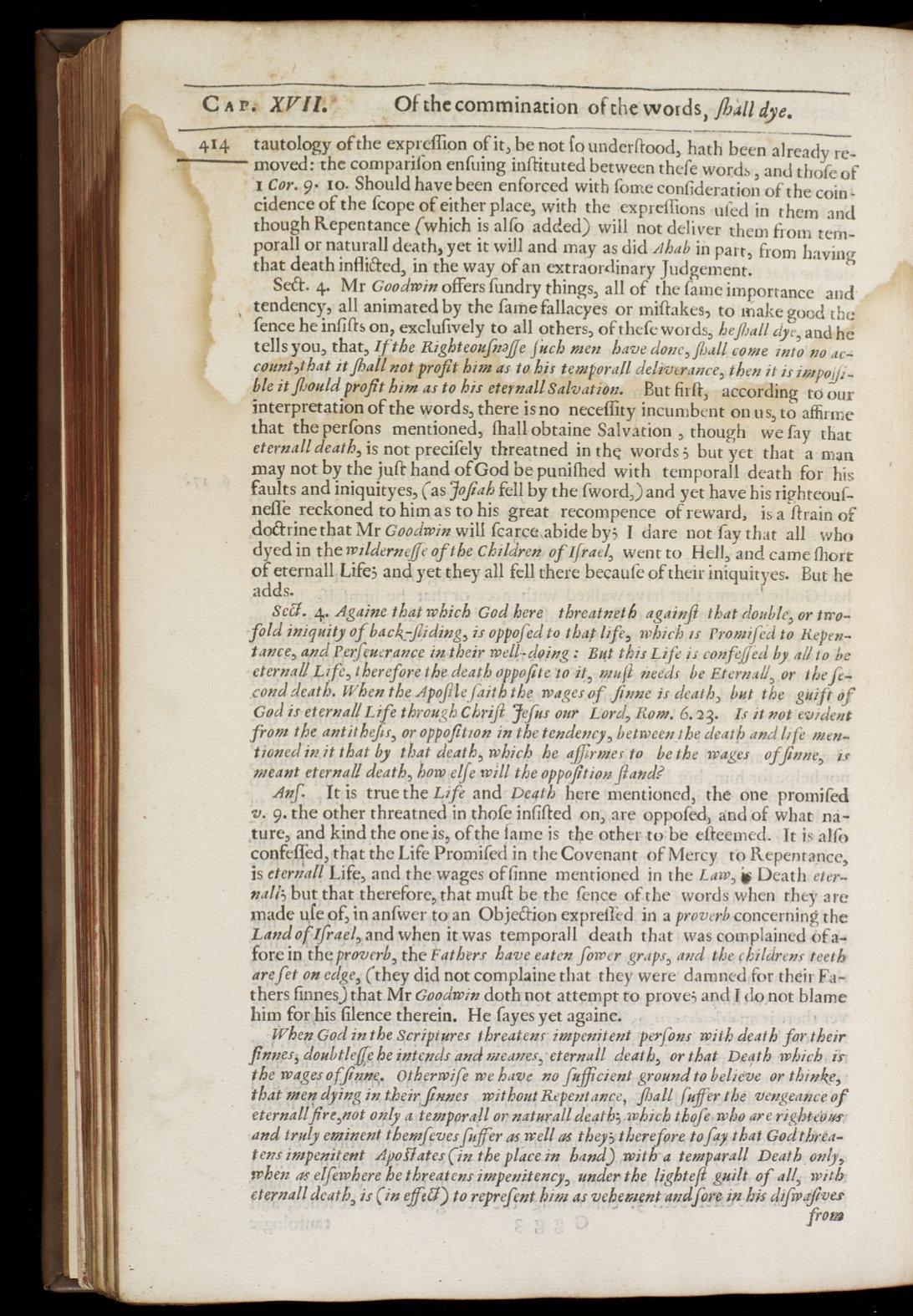

C
A
P.
XVII.
Of
the
comrnination
ofthe words,
fhàll
dye.
414 tautology
ofthe
expreffion
of
it,
be not fo underftood, hath been already re-
moved:
the
comparilon enfuing inftituted between
thefe
words,
and
thofe
of
Cor.
9.
ro. Should have been enforced with
force
confderation
of
the
coin-
cidence
of
the
fcope
of
either
place, with
the
expreflìons ufed
in
them and
though Repentance (which
is
alto
added)
will
not deliver them from tem-
porall
or naturali death,
yet
it
will
and may
as
did
Ahab hi
part,
from
having
that
death
infli&ed, in
the
way
of
an extraordinary Judgement.
Se&.
q..
Mr
Goodwin
offers
fundry things, all
of
the
fame importance
and
tendency,
all
animated
by the fame
fallacyes
or
miftakes,
to
make good the
fence he
infits
on,
exclufively
to
all
others,
of
thefewords,
hefhall
dy,
and
he
tells
you
that,
Ifthe
Righteoufnafe
f
ich
men
have done,
Atli
come
into
no
ac-
count,that
it
(hall
not
profit him
as to
his temporali deliverance, then
it
is
impoEi .
ble
it
fhould profit him
as to
his eternall Salvation. But firlt,
according to
our
interpretation
of
the
words,
there
is
no
neceffity
incumbent
onus,
to
affirme
that the
perfons
mentioned, than obtaine
Salvation
,
though
we
fay
that
eternall death,
is
not
precifely
threatned
in
the
words;
but yet
that
a
man
may
not
by
the
jufi'
hand
of
God
be
punifhed
with temporall death for
his
faults and
iniquityes,
(as
Yofiah
fell
by
the
(word,)
and yet
have
his
righteouf-
neffe
reckoned
to
him as
to
his
great
recompence
of
reward,
is a
ftrain
of
doetrine
that
Mr
Goodwin
will fcarce
abide
by
I
dare
not
fay
that
all who
dyed
in
the
rodderneffe
of
the Children
ofIfrael,
went to Hell,
and camefliort
of
eternall
Life;
and yet they
all
fell
there
beçaufe
of
their iniquityes.
But
he
adds.
Sell.
4. Againe
that
which God
here
threatneth againfi that
double, or
two-
fold
iniquity
of
backEliding,
is
oppofed to
that
life,
which is Promifed
to Repen-
tance, and
Perfeuerance
in their
well-
doing:
But
this Life is
con
feffed
by
all
to
be
eternall
Life,
therefore the death
oppo
fate
to
it,
mu(l needs be
Eternal/,
or
the
fe-
cond
death.
When
the
Apo
filefaith
the
wages
of
finne is death,
but the
gxi
ft
of
God is
eternall
Lie
through Chrifi
jefas
our
Lord, Rom. 6.23.
Is
it
not evident
from
the
antithe
as,
or oppofition
in
the tendency,
between
the death
and
life
men
-
tioned
in
it
that
by
that
death,
which he
armes
to
be
the
wages
offnne,
is
meant eternall death,
how elfe
trill
the oppofitionEland?
Anf.
It
is
true
the
Life and
Death
here mentioned, the one promifed
v.
g.
the
other threatned
in
thofe
infifted
on,
are oppofed, and
of
what
na-
ture
,
and kind
the
one is,
of
the
fame
is
the other to be
efteetnecl.
It
is
alfa
confeflèd,
that
the
Life
Promifed in
the Covenant
of
Mercy
to Repentance,
is
eternall Life,
and
the
wages
of
thine
mentioned
in
the
Law,
Death
eter-
nall;
but
that
therefore,
that
muff be
the
fence
of
the
words
when
they are
made
life
of,
in
anfwer to
an
Obje
&ion expreffed in
a
proverb
concerning
the
Land
oflfrael,
and when
itwas
temporali death
that
was
complained
of
a-
fore
in
the
proverb,
the
Fathers have
eaten
fower
grails,
and
the
children
teeth
arefee
on edge,
(they
did not complaine
that
they
were
damned
for
their Fa-
thers
finnes)
that
Mr
Goodwin
doth
not attempt
to prove;
and
I donor
blame
him for his
filence
therein. He
layes
yet
againe.
When God
in the scriptures
threatens- impenitent perfons with death
for
their
finites,
doubtlefehe intends
and
nreanes
,-eternall death,
or
that
Death
which
is
the
wages
off/line. otherwife
we
have
no
fufficient ground
to
believe or
thinke,
that
men dying
in
theirfnnes
without Ripent
am-
fballfufferthe
vengeance
of
eternallfzre,not
only
a
temporall
ornaturall
death;.
which
tbofe
who
are rsghteaur
and
truly eminent themfeves
fufer
as
well
as
they;
theree
ffore
to
fay
that
God
threa-
t
ens
impenitent Apollates
(in
the place
in hand) with
a
temparall Death
only,
when
aselfewherehe threatens
impenitency,
under the lighted guilt
of
all, with
eternall death,
is
(in
effal)
to reprefent
him as vehement
andfore in
his
difweivei
from










